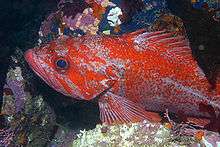Sebastes miniatus
| Sebastes miniatus | |
|---|---|
 | |
| Scientific classification | |
| Kingdom: | Animalia |
| Phylum: | Chordata |
| Class: | Actinopterygii |
| Order: | Scorpaeniformes |
| Family: | Sebastidae |
| Genus: | Sebastes |
| Species: | S. miniatus |
| Binomial name | |
| Sebastes miniatus (D. S. Jordan & C. H. Gilbert, 1880) | |
Sebastes miniatus is a species of rockfish known by the common names vermilion rockfish, vermilion seaperch, red snapper, and red rock cod. It is native to the waters of the Pacific Ocean off western North America from Baja California to Vancouver Island.
The body of the vermilion rockfish is moderately deep and compressed. The upper profile of the head is somewhat curved; the mouth is large, with the lower jaw slightly projecting. The color is bright red on the body and fins; many with black and gray mottling on back and sides. On fish shorter than 12 inches (30 cm) the mottling is much more apparent and the fins are often edged with black. The yelloweye and canary rockfishes are similar in appearance to the vermilion, but the bottom of their lower jaws is scaleless and feels smooth to the touch. The vermilion rockfish has scales on the bottom of the lower jaw which make it rough to the touch. It may also be confused with the brown rockfish (Sebastes auriculatus) in deep water.
Range
The vermilion rockfish occurs from pacific oceans, Baja California, to Vancouver Island, Canada. It is generally caught over rocky bottoms at depths of 100 to 500 feet (30 to 152 m), although it has been taken from depths as great as 900 feet (270 m).
Reproduction
The vermilion rockfish appears to mature and spawn for the first time at age 3–4. A vermilion rockfish that was 20 inches (51 cm) long was estimated to contain 282,000 eggs. By this measure a 30 inches (76 cm) female might hold as many as 500,000 eggs. The principal reproductive period is from December through March.
As with all other rockfish, fertilization is internal and the young are mobile. The free swimming young feed primarily upon shrimp–like organisms, while the larger, bottom–living adults feed almost exclusively upon fishes (smaller kinds of rockfish), squid and octopus.
Fishing
Because a good rockfish "hole" often will yield a dozen or more kinds on any given day, it has been said that rockfish fishing is colorful, interesting, productive, and mysterious. Vermilion rockfish usually are found in the bag of "red" rockfish taken from one of these holes. The same rig, bait, and technique used for bocaccio works for vermilion rockfish. Rebaiting can be reduced by using a tough, difficult-to-steal bait, such as a piece of squid or salted mackerel.
References
- This article was copied from California Marine Sportfish by the California Department of Fish and Game, Marine Region; a public domain resource.
External links
| Wikimedia Commons has media related to Sebastes miniatus. |